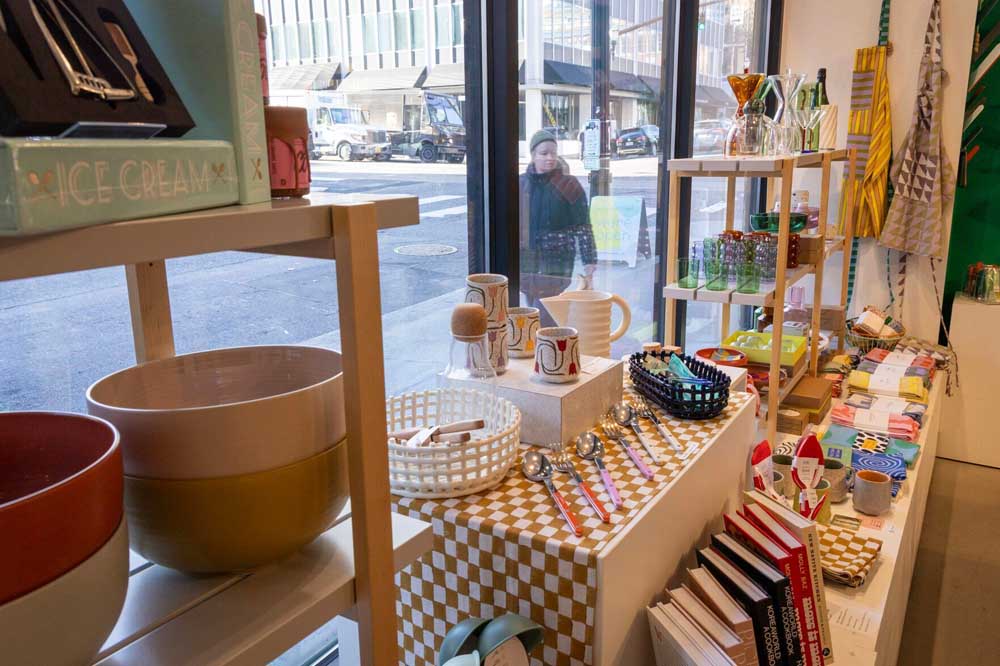Downtown Portland’s glimmer of hope
Published 2:00 pm Thursday, January 30, 2025

- A person looks at the merchandise for sale at Woonwinkel as she walks by the store. A new survey says people are feeling slightly more optimistic about Downtown Portland.
Here’s the good news, Portlanders:
Trending
Foot traffic is up. Negativity from visitors is down. And progress is being made.
That’s the upshot from a new survey, released Thursday, Jan. 30, showing some modest but positive news for Downtown Portland.
The tough part is actually getting people from Portland’s outer neighborhoods and suburbs to make the trip downtown.
Trending
“When we get them downtown, they say, ‘Hey, downtown is better than we heard,’” said Jon Isaacs, executive vice president of public affairs for the Portland Metro Chamber.
The trick, then, is getting them downtown.
Those are some of the upshots from a new survey conducted by DHM Research on behalf of the chamber.
The survey of 700 registered voters in Multnomah, Washington, and Clackamas counties (300 residents of Portland and 400 from elsewhere in the tri-county area) tracked opinions about the economy, jobs and issues impacting communities over time. It assessed respondents’ top priorities, explored what draws people downtown and highlighted economic opportunities. The survey was conducted Dec. 12-20 and has a margin of error of plus or minus 3.7%.
The focus areas were: Views of Downtown Portland, the economic outlook for the entire tri-county region, community sentiments regarding the region, and perceptions of taxes paid.
It’s a snapshot, said Michelle Neiss of DHM Research. While the survey is not all sunshine and roses for downtown, it’s generally more positive than past annual surveys conducted by the same agency.
“Wrong direction/right track is just a very general gauge of what people are feeling, and what we can see is that they are noticing improvements in Downtown Portland,” Neiss said.
Compared to past years, the big question that hovers over this survey is: How have people’s feelings about Portland changed?
John Horvick of DHM Research said the biggest concerns of Portlanders remain constant: Homelessness, crime and cost of living. “These are the things that Portlanders, and people around the region, say we have to get better at. And it looks like we’re seeing some progress. We see that in the data.”
Isaacs homed in on one specific stat in the report: a year-over-year improvement by almost 20 points in the view of safety downtown during the day. “That’s a huge deal. And it’s incredibly validating,” he said, because city leaders in government and the business community have focused specifically on that.
The trend line
Horvick said DHM Research had asked this question: “Is the city heading in the right direction or wrong track,” for decades. In the 1990s and 2000s, consistently, something like 65% to 75% of respondents said Portland was heading in the right direction.
That eroded away around 2021 and 2022 in the wake of the pandemic, protests, an economic downturn and the crises of homelessness and fentanyl. At its nadir, around 80% of respondents said the city was on the “wrong track.”
But Horvick said that recent survey results are finally seeing a bit of uplift.
“The numbers we’re seeing in this presentation aren’t historically good, but they’re all so much better than we were a couple of years ago,” he said. “It is a bit of how you want to interpret it. I think, if I were to look at it in a positive way: We’re working our way out of the hole that we were in a couple of years ago.”
Horvick added, “We have the potential within our community to get back to a place where most people feel positive. It is within our capacity. We’re working toward it. But we’re still quite a distance from that.”
He summed it up: “Better than two years ago, not as good as we’ve been, but … it’s something we can achieve. We did it in the past.”
Michelle Neiss of DHM pointed to a split in the survey results: People saw improvements in quality-of-life issues but less so in economic issues, such as the cost of living and taxes.
“When I take people downtown, it’s like, ‘Oh, this is looking better. It feels better. ‘You see that in how they talk about (downtown).”
Downtown Portland
One takeaway shared with local reporters before the report was officially released was that nearly two-thirds of those surveyed visited downtown in the last month, though not often. Most of those who came downtown did so fewer than five times in the prior month.
A quarter of the respondents who came downtown did so for business or work, about 17% for dining, and 12% each for shopping or to attend live entertainment.
The survey shows that most respondents were interested in events related to food, performing arts and music.
That’s part of the good news.
The less-than-good news: Respondents were evenly divided on whether Downtown Portland has improved in the past year: 29% say it’s gotten better, 31% say it’s stayed the same, and 33% say it’s gotten worse.
The top issues that dissuaded respondents from visiting downtown in the past year are easy enough to guess: open-air drug use, homelessness and crime. That was truer for suburbanites than for people coming from Portland’s outer neighborhoods.
Only six in 10 respondents said they feel safe in downtown Portland during the day. That number dipped for Republicans, non-Hispanic voters of color and suburbanites, the survey reads.
Economic outlook, plus taxes
More than four in 10 correspondents, regardless of where they live, told DHM Research that their households are worse off compared to two years ago, but with subtle shifts that signal improvement, according to the researchers.
Also, most participants across the region say they think the taxes they pay are too high for the level of services they receive.
That matters, says Andrew Hoan, president and CEO of the chamber.
“We should borrow the axiom, ‘It’s the economy, stupid.’ Right? It does matter,” Hoan said. “It is driving key issues here in our community about being able to afford a home and have a vibrant place to live.”
In January, Portland’s form of government switched from a mayor and five commissioners to a mayor with vastly less power and 12 councilors.
The Portland correspondents in the 2024 survey said they want the newly elected officials to prioritize support and services to address homelessness. In descending order, the top priorities of those surveyed were homelessness support and services, public safety, and increasing the availability of affordable housing. Lesser priorities included maintaining transportation, supporting small businesses, addressing climate change, land-use planning, urban design, parks and recreation, and arts and culture.
However, this follows news that the City Council is facing a budget shortfall. Budget writers estimate the city will need to reduce spending by more than $100 million. In January, Mayor Keith Wilson and Council President Elana Pirtle-Guiney issued a joint statement calling it an “unprecedented and painful budget crisis.”
In the wake of that, more than half of the Portlanders in the DHM survey oppose increasing local taxes to address the city’s budget shortfall.
Community sentiment
This part of the survey focused on the tri-county area as a whole — not just downtown.
Negative voter sentiment about the direction of the Portland region has decreased since 2023. Washington County respondents were most likely to feel that their county was heading in the right direction, while Multnomah County respondents were more likely to feel that it was heading in the wrong direction.
The most significant issues facing respondents, regardless of where they live:
- 35%: Homelessness
- 18%: Affordable housing.
- 12%: Safety, crime, lack of police presence.
- 7%: Cost of living and inflation.
- 6% Drug use and addiction.
- 6% High taxes.
Portlanders in the survey were more concerned about homelessness and drug use, while suburbanites were more concerned about the cost of living.
Tribune staffer lives, shops and eats in downtown. See column, Page A6.
“We should borrow the axiom, ‘It’s the economy, stupid.’ Right? It does matter. It is driving key issues here in our community about being able to afford a home and have a vibrant place to live.”
Andrew Hoan, president and CEO, Portland Metro Chamber
“These are the things that Portlanders, and people around the region, say we have to get better at. And it looks like we’re seeing some progress. We see that in the data.”
John Horvick, DHM Research







